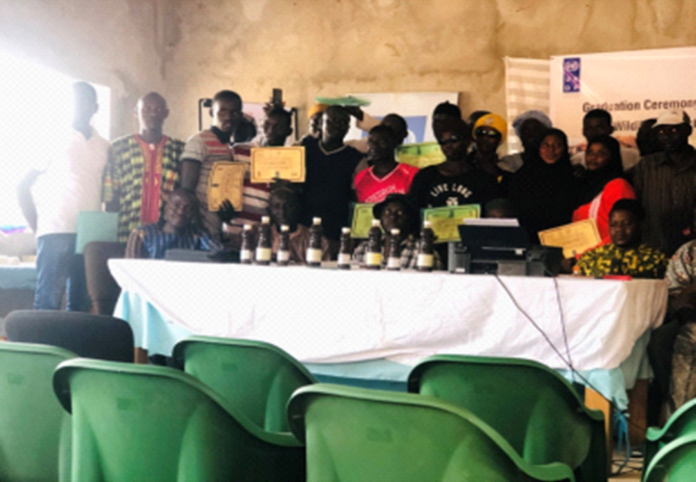By Mariama Marong / Madiba Singateh
Beekeeping is a non-cropping activity that can serve as a suitable alternative to transform livelihoods of small scale rural households in the advent of climate change and the Covid-19 pandemic that made farming less attractive.
This remark was made by Jerro Maane, a Beekeeping technical advisor during the graduation of 30 youth, who went through a week-long intensive training, which kicked started from 1st to 6th of this month.
The participants were selected from the North Bank Region (NBR), Lower River Region (LRR) and Central River Region (CRR) on beekeeping production held on April 7, 2022 at NBAG Nyambai Forest.
The training was funded by ITC and UNDP in building resilience of communities’ projects.
“The advantages of beekeeping which makes it fit well in farmers’ livelihoods are that operations involved in beekeeping are done when other farming activities are not taking place and it does not compete with other crops for land. Hence, bees fly and collect pollen and nectar everywhere on both cultivated and wasteland areas,” Jerro Maane said.
Mr. Maane said the introduction of beekeeping will create a new economic activity that can augment the incomes of the poor and vulnerable communities dwelling in poverty.
Maane noted that the intervention made by ITC and UNDP has consolidated the previous gains achieved in the beekeeping sub-sector. He commended the government for providing an enabling environment for the international donors to come and resuscitate the economy of the country.
“Despite this heavy investment in the beekeeping sub-sector, sustainability was observed as an inherent problem emanating either from poor performance [or] contractors’ lack of interest in the trade by those who benefited from the training package,” he said.
Maane emphasised that there is a need to change that culture within the beekeeping sector, through building resilience of communities and the training of youth who are involved in the sector.
He urged the trainees to be enthusiastic with beekeeping and not to allow funds to go down the drain because a range of materials would be supplied to them, adding that a lot of investment has been injected on each beekeeper.
Yusupha Keita, an official from International Trade Centre (ITC), said beekeeping production is aimed at addressing the challenges that the world is faced with and the Gambia is no exception.
He said the advent of climate change, COVID-19 and the war between Russia and Ukraine have also contributed to the issue that people are encountering.
Mr Keita highlighted the importance of skill training as a means to develop a country and help to address challenges that are affecting the people. He said it is key to learn how beekeeping is done from the production to the end user, which he said, will serve as a benefit for both individual, community, and the country at large.
He said that honey is delicious and has health benefits that are mostly needed by many, while using the moment to acknowledge the National Beekeeping Association of The Gambia for their support towards the progress of this training.
Nuha Jammeh, a representative from Parks and Wildlife Department, said bee development is a global venture which generates good income for the producer.
Jammeh called on the participants to avoid bush burning in the process of beekeeping as both bees and other animals within the forest will be affected.
Maria Jobe, a participant, said they will be good ambassadors to their various regions as beekeepers trained with the best methodology.
Madam Jobe appealed to the funders, ICT and UNDP, to support them with the sustainability aspect of what they have learned to fully utilize it and also thanked the trainers from NBAG for what she called work achieved and work well done.



















